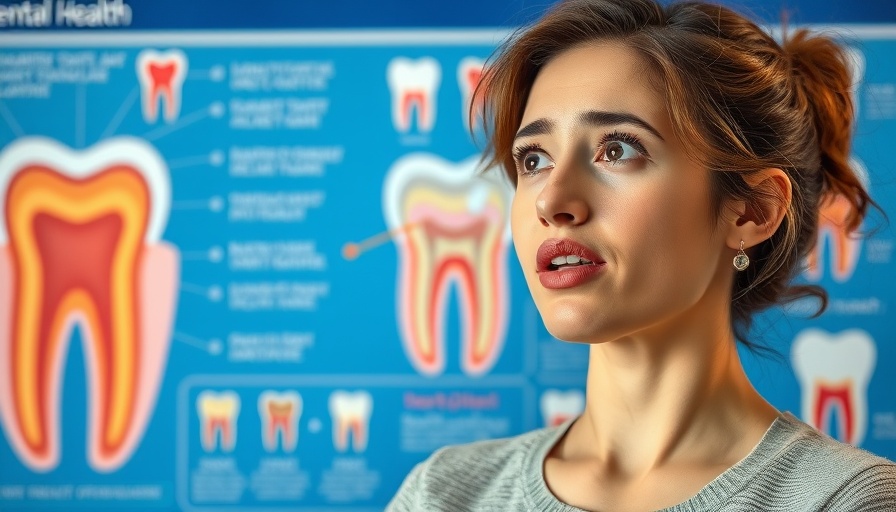
Fluoride and the Pineal Gland: What's the Connection?
In recent years, the conversation surrounding fluoride has raised eyebrows, particularly regarding its potential effects on the human body. A recent video brought attention to the claim that fluoride affects pineal gland growth, a topic lacking robust scientific inquiry but worthy of exploration. The pineal gland, a small, pea-shaped gland located in the brain, plays a crucial role in regulating sleep patterns and biological rhythms, primarily through the secretion of melatonin. Understanding how substances like fluoride may impact this gland is essential for promoting dental health while ensuring our overall wellness.
In 'he thinks fluoride affects his pineal gland... #shorts', the discussion dives into the controversial effects of fluoride, inspiring us to analyze its implications for dental health and wellness.
The Role of Fluoride in Dental Care
Fluoride has been lauded for its benefits in dental care, especially in cavity prevention. By enhancing remineralization, fluoride helps strengthen tooth enamel, making it less susceptible to decay. This has led to its widespread use in toothpaste, mouth rinses, and public water systems. However, the concern that fluoride could affect brain functions, particularly in children whose bodies and brains are still developing, has prompted some to reconsider its ubiquity in our oral hygiene routines. It’s vital, therefore, to find a balance between utilizing fluoride for its dental benefits while being mindful of potential health implications.
Insights from Public Health and Wellness Experts
Many health experts advocate for the benefits of fluoride in dental hygiene, citing studies that demonstrate significant reductions in cavities in populations that use fluoridated water consistently. However, the voices that question fluoride's safety often highlight fears of its broader effects on health, from potential neurotoxicity to its supposed influences on endocrine functions, including the pineal gland. While the debate continues, many dental health professionals encourage a strategy that includes regular checkups, proper brushing and flossing techniques, and considering fluoride consumption within a broader context of health and wellness.
Looking Beyond Fluoride: Comprehensive Dental Hygiene
Aside from emphasizing fluoride's role in preventing cavities, focusing on a comprehensive oral hygiene routine is paramount. Regular visits to the dentist for dental cleaning, the use of dental products like mouthwash and floss, and treatments such as braces or veneers can significantly contribute to optimal oral health. For instance, maintaining healthy gums is crucial in preventing gum disease, and the linkage between oral health and overall health indicates that neglecting one can ultimately impact the other.
Exploring Dental Myths and Facts
As discussions around fluoride intensify, myths can cloud public perception. One common myth is that fluoride causes more harm than good without any proven benefits. In reality, it’s a matter of using the right amount, as excessive exposure can indeed lead to dental fluorosis in children. Educating the public on these nuances is essential for forming a more informed stance on dental care practices. Moreover, a thorough understanding of other dental health factors—such as the role of diet in oral hygiene, the impact of dental treatments on overall health, and the importance of regular dental check-ups—can empower individuals to take charge of their dental health.
Empowering Individuals with Knowledge
To effectively navigate the complexities surrounding fluoride and dental health, individuals should have access to reliable dental education and professional advice. Engaging with a dentist can dispel myths about fluoride and clarify how it fits into a broader oral care routine. Additionally, considering alternatives to fluoride, such as fluoride-free dental products, can offer peace of mind for those concerned about its effects. Access to this information not only ensures healthier teeth, but also a more proactive and empowered approach to overall health.
Conclusion: A Balanced Approach to Dental Hygiene
The conversation sparked by videos discussing fluoride's impact on the pineal gland serves as an entry point for exploring our relationship with dental care products and practices. While fluoride remains a trusted ally in cavity prevention, it’s also imperative to incorporate comprehensive dental hygiene, including healthy dietary choices and regular dental visits, into our routines. Equipped with knowledge and the right tools, individuals can better navigate their dental health, ensuring that they maintain not only healthy teeth but overall wellness. Remember, consistent dental care leads to a brighter smile and a healthier you!
 Add Row
Add Row  Add
Add 




Write A Comment